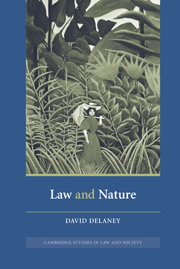Book contents
- Frontmatter
- Contents
- Acknowledgments
- Part I Situating nature
- 1 Introduction: the pragmatics of nature and the situation of law
- 2 The nature of modern political discourse: doing things with nature
- 3 The natures of scientific discourse
- 4 The natures of legal discourse
- 5 The natures of legal practice
- Part II Rendering nature
- Part III Judging nature
- References
- Index
1 - Introduction: the pragmatics of nature and the situation of law
Published online by Cambridge University Press: 22 July 2009
- Frontmatter
- Contents
- Acknowledgments
- Part I Situating nature
- 1 Introduction: the pragmatics of nature and the situation of law
- 2 The nature of modern political discourse: doing things with nature
- 3 The natures of scientific discourse
- 4 The natures of legal discourse
- 5 The natures of legal practice
- Part II Rendering nature
- Part III Judging nature
- References
- Index
Summary
Wilderness, animals, bodies, and brains. Rivers, oceans, endangered species. Pets. Laboratory monkeys, dancing bears, and killer bees. Sperm. Conception, gestation, lactation. Breeding. Giving birth. Genes, chromosomes, and hormones. Lust. Sodium, potassium, electromagnetism, and sexuality. Hurricanes and neurotransmitters. Corn. Iron. Oxygen, nicotine, and blood. Northern white pines, schizophrenia, comets, and death. Black raspberries and instincts. That fish, this urge, these symptoms, those asteroids. Nature.
There is, in the world that humans have created, the concept “nature.” There is also in Western culture a range of more specific conceptions of nature – theological, scientific, philosophical, and common. Then there are the things, places, or events in and of the world to which the designations “nature” or “natural” are applied or from which they are withheld. One element that appears to hold many of these together has to do with that which they are not. Distinguished from nature in many conceptions are those critical aspects of humanness – consciousness, intentionality, culture, knowledge, and so forth – which, if not regarded as unnatural, are generally considered to be of such a radically different ontological status as to justify a basic distinction in kind between the human and the natural, between humans and other animals or life forms, between bodies and minds, and, more specifically, between brains as matter and mind as, well, something else.
- Type
- Chapter
- Information
- Law and Nature , pp. 3 - 27Publisher: Cambridge University PressPrint publication year: 2003

